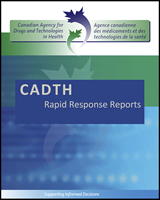Couples Therapy for Adults Experiencing Relationship Distress: A Review of the Clinical Evidence and Guidelines
Rapid Response Report: Summary with Critical Appraisal
The last iteration of the Canadian census (2008) that included questions regarding marriage and divorce reports that approximately 40% of marriages in that year will end in divorce before the 30th wedding anniversary. While only a proxy, the high divorce rate in Canada suggests a similarly high prevalence of relationship distress, a situation where one or both partners are dissatisfied with their intimate relationship and that is characterized by conflict. Relationship distress can result in higher levels of psychological and physical health concerns in both partners, in addition to health and social role impairments among children, other family members, co-workers and friends.
Recent studies have helped to identify that the association between relationship distress and negative health outcomes is cyclical. Not only does relationship distress lead to negative psychological health outcomes such as depression, anxiety and substance abuse, it can also result from situations where couples must respond to and cope with these concerns. Other contributors to relationship distress are varied and can include such experiences as the diagnosis of a terminal illness, living with chronic disease, living with mental health disorders, infidelity, unresolved childhood trauma, among others.
Couples therapy is widely practiced as a means to improve relationship distress, and is often an expected course of treatment when couples are faced with conflict. The main premise of is that guiding couples through their conflict as a collaborative team is more beneficial than working with only one member alone. While couples therapy is widely practiced, the effectiveness of couples therapy as an intervention to improve relationship distress is unclear. The purpose of this review is to summarize published research and evidence-based guidelines regarding the effectiveness of couples therapy for adults experiencing relationship distress from any cause.
Disclaimer: The Rapid Response Service is an information service for those involved in planning and providing health care in Canada. Rapid responses are based on a limited literature search and are not comprehensive, systematic reviews. The intent is to provide a list of sources of the best evidence on the topic that CADTH could identify using all reasonable efforts within the time allowed. Rapid responses should be considered along with other types of information and health care considerations. The information included in this response is not intended to replace professional medical advice, nor should it be construed as a recommendation for or against the use of a particular health technology. Readers are also cautioned that a lack of good quality evidence does not necessarily mean a lack of effectiveness particularly in the case of new and emerging health technologies, for which little information can be found, but which may in future prove to be effective. While CADTH has taken care in the preparation of the report to ensure that its contents are accurate, complete and up to date, CADTH does not make any guarantee to that effect. CADTH is not liable for any loss or damages resulting from use of the information in the report.
Copyright: This report contains CADTH copyright material and may contain material in which a third party owns copyright. This report may be used for the purposes of research or private study only. It may not be copied, posted on a web site, redistributed by email or stored on an electronic system without the prior written permission of CADTH or applicable copyright owner.
Links: This report may contain links to other information available on the websites of third parties on the Internet. CADTH does not have control over the content of such sites. Use of third party sites is governed by the owners’ own terms and conditions.
Except where otherwise noted, this work is distributed under the terms of a Creative Commons Attribution-NonCommercial- NoDerivatives 4.0 International licence (CC BY-NC-ND), a copy of which is available at http://creativecommons.org/licenses/by-nc-nd/4.0/
